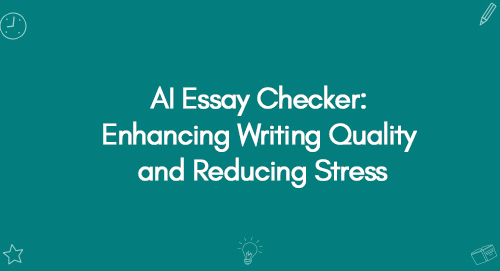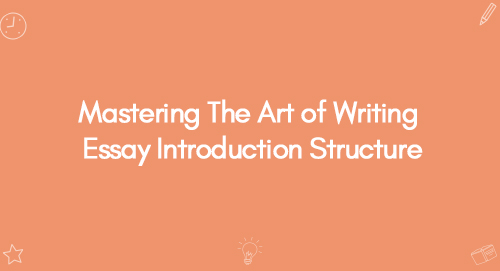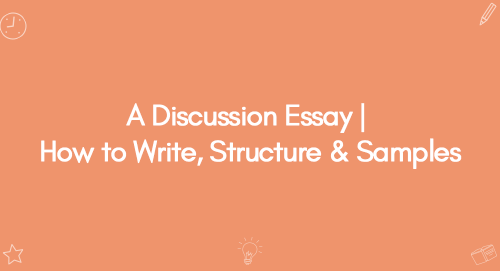How to Write a Psychology Essay | Everything You Need to Know
How to Write a Psychology Essay | Everything You Need to Know
Psychology is all about the study of mind and behaviour. A psychology essay is a college essay discussing psychological concepts, theories and situations.
Learn How to Write Evaluation Essay
This comprehensive guide provides a detailed overview of how to write a psychology essay effectively. The guide offers tips and tricks for writing a psychology essay. It also discusses different types of psychology essays, including a psychology essay example.
You may also like to review
Example: 1 Discursive Essay Example
What is a Psychology Essay?
A psychology essay is a piece of writing that assesses a student's understanding of a specific situation or reaction. The psychology essay is a specialized college assignment that students will likely encounter if they are pursuing a degree in psychology. The key to writing an excellent psychology essay is to focus on a single psychological theory or concept and discuss it in detail.
How to Write a Psychology Essay? 5 Easy Steps
Here is a step-by-step approach to writing a psychology essay in five easy steps.
Plan your Strategy
The pre-planning phase is prepared when you approach your assignment by slowly reading it. This is also the stage where you determine your techniques on how you will write the essay; it includes time for research, time to synthesize data and writing.
Research and Analysis
Academic databases in the university library operate as a good starting point for research on your topic. In the process of reading through actual journal articles that you find, highlighting the relevant sections or phrases will help in referencing during writing. By organising your essay you are more likely to remember the information you have added through your highlighted key. Moreover, you may have proper references and all information readily available.
Outline Your Psychology Essay
Your essay outline is a way of organizing your work and creating your roadmap. It also guarantees to maintain concentration on your subject. Having outlined in a more or less detailed way will guarantee that all the points associated with the topic will be addressed properly and logically, maintaining information together. Essay outline also greatly facilitates the filling of the remaining part of the essay, because your concept-generation process is essentially written for each paragraph on creating your outline.
Writing the Essay
For those who have not written an outline, the essay flow is crucial. Generally, the following sections are used either together with or without proper subheadings.
Introduction
This part will include interesting facts, and figures and provide a background to the problem including what is being discussed in the essay why your particular approach makes it unique etc. You need to highlight your reasoning for writing this essay.
Research question
After you show your topic area, it should be followed by the research questions.
Literature review
The literature should offer insight into the topic or research questions posed by supporting what is stated in updated academic sources. A recap of the literature cited in the form of a critical analysis should follow your presentation.
Conclusion
The conclusion should recap what you’ve presented and leave the reader without any additional follow-up questions.
Proofread and Edit
Even the best writer must proofread their essay. If you are using a computer, it is recommended that you use an up-to-date spell check set for your language, such as UK English rather than US English which will also check for grammatical errors. Re-read your essay again after your spell check to ensure that you’ve said what it is you want to say. Don’t write just to fill word count requirements. Make each word meaningful.

Psychology Essay Example
This psychology essay example explores emotional intelligence's significance, components and implications for mental well-being. The essay emphasizes the vital role of emotional intelligence in fostering mental resilience and overall psychological functioning.
Title: The Role of Emotional Intelligence in Mental Well-being
Introduction
Emotional intelligence (EI) is a concept that has garnered significant attention in the field of psychology in recent years. Defined as the ability to perceive, understand, manage, and regulate one's own emotions as well as those of others, EI plays a crucial role in various aspects of life, including personal relationships, academic and professional success, and mental well-being. This essay explores the significance of emotional intelligence in promoting mental well-being, discussing its components, mechanisms, and implications.
Body Paragraphs
Understanding Emotional Intelligence
Emotional intelligence encompasses a range of abilities that contribute to effective emotional functioning. These abilities are typically categorized into four main components: self-awareness, self-management, social awareness, and relationship management. Self-awareness involves recognizing and understanding one's own emotions, strengths, weaknesses, and values. Self-management refers to the ability to regulate one's emotions, impulses, and behaviors in different situations effectively. Social awareness involves perceiving and understanding the emotions and perspectives of others, while relationship management pertains to the ability to establish and maintain healthy relationships with others.
Mechanisms of Emotional Intelligence
The mechanisms through which emotional intelligence influences mental well-being are multifaceted. Firstly, individuals with high EI are better equipped to cope with stress and adversity. By being aware of their emotions and employing effective emotion regulation strategies, they can navigate challenging situations more resiliently, reducing the likelihood of experiencing negative psychological outcomes such as anxiety and depression.
Implications for Mental Well-being
Research suggests a strong correlation between emotional intelligence and various indicators of mental well-being. Individuals with higher levels of EI tend to report lower levels of psychological distress, greater life satisfaction, and enhanced overall psychological functioning. Moreover, emotional intelligence has been linked to adaptive coping strategies, such as positive reframing and seeking social support, which further contribute to mental resilience and well-being. Conversely, deficits in emotional intelligence have been associated with a range of mental health problems, including mood disorders, interpersonal difficulties, and maladaptive coping behaviours.
Conclusion
In conclusion, emotional intelligence plays a vital role in fostering mental well-being by enhancing individuals' abilities to understand, manage, and navigate their emotions and social interactions. By cultivating emotional intelligence through various interventions and strategies, individuals can develop resilience, cope with stress more effectively, and foster healthier relationships, ultimately leading to greater overall psychological functioning and well-being. As such, the promotion of emotional intelligence should be prioritized in efforts aimed at improving mental health and well-being across diverse populations.
Tips and Tricks to Write a Psychology Essay
When writing a psychology essay, you should consider several factors. In psychology, these factors come in handy when it comes to how to write an essay. Such key tips include
- Adequately Evaluate the Essay Question
The essay question should be analyzed to determine what elements you are expected to cover and their scope. To identify the narrow issues and resources that need mentioning there are several steps you should do. The first one is to split the essay question into parts and subparts, then put everything in order.
- Conduct Preliminary Research
Before the essay topic creation, try a mini-research to get what makes sense for brainstorming related content and how is better to phrase it. If it is a takeaway essay, enough time should be allocated to do a bit of research regarding the topic which will inform you on what the essay should concentrate on. The gained insight must also be applied to redefine the subject of the essay and its thesis. This is vital in defining the scope of the essay.
- Reflect Throughout your Essay
You have to make sure that only viewpoints which are based on facts and evidence from credible sources are used, you need to take your language in such a way as to tell a story the simplest way.
- Ensure Psychology Essays Format
Psychology essays should have a proper structure and format. Ensure that your paper essay follows the right format. Interestingly it is important to note that in almost all cases, psychology essays utilize the APA essay format.
Free Premier Essay Writing Topics
Essay Writing is an essential part of academics which presents the ideas, arguments, opinions, or positions of the writer regarding the topic. The writer supports his claims using facts, evidence, or survey studies.
- Clear presentation or understanding of the type of essay
- An appealing introduction with an unambiguous thesis statement
- A well-defined structure of body paragraphs supporting the thesis
A prospective conclusion with an optimistic tone
Types of Psychology Essays
These are just a few examples of the types of psychology essays that students or researchers may encounter.
- Research Essays
These essays typically focus on reviewing and analyzing empirical research studies within a specific area of psychology. They may involve critiquing research methodologies, summarizing findings, and discussing implications for theory or practice.
- Theoretical Essays
These essays explore and evaluate different psychological theories or perspectives on a particular phenomenon or psychological topic. They may delve into the historical development of theories, compare and contrast different theoretical frameworks, and discuss their relevance and application in understanding human behaviour.
- Case Study Essays
Case study essays involve in-depth analyses of individual cases or clinical scenarios to illustrate psychological principles, diagnostic criteria, treatment approaches, or ethical considerations. They often require applying theoretical concepts to real-life situations and discussing implications for practice.
- Experimental Design Essays
These essays focus on designing and critiquing research experiments within psychology. They may involve proposing research hypotheses, outlining experimental procedures, discussing potential confounding variables, and evaluating the validity and reliability of findings.
- Application Essays
Application essays apply psychological principles or theories to real-world contexts or contemporary issues. They may explore how psychological concepts can be used to address societal challenges, improve organizational functioning, enhance mental health interventions, or inform public policy.
Conclusion
In conclusion, writing a psychology essay requires diligence, critical thinking, and effective communication skills. By following the guidelines outlined in this guide, students can navigate the writing process successfully and produce essays that demonstrate their knowledge and understanding of psychological principles and concepts.





















